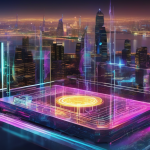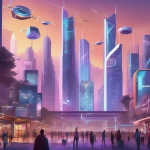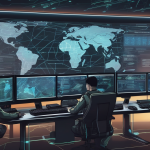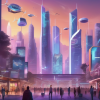The Rise of AI-Generated Scripts in Hollywood

The film industry is experiencing a seismic shift, and at the heart of this transformation is the rise of AI-generated scripts. As technology advances, the way stories are crafted and produced is evolving rapidly. This article delves into the profound influence that artificial intelligence is having on creativity, production processes, and the very future of screenwriting in Hollywood. Imagine a world where a computer can not only analyze box office trends but also generate compelling narratives that resonate with audiences. Sounds like science fiction? Well, it’s becoming a reality!
To truly grasp the impact of AI on screenwriting, we need to understand the evolution of this art form. Traditionally, screenwriting was a labor of love, steeped in human emotion and creativity. Writers would spend countless hours brainstorming, drafting, and refining their scripts. However, as technology began to creep into the process, we saw the emergence of tools designed to assist writers. From simple word processors to complex software that analyzes story structure, technology has gradually integrated itself into the screenwriting process. This evolution paved the way for AI, which now promises to revolutionize how scripts are developed.
AI tools are not just enhancing the writing process; they are revolutionizing script development. These advanced applications assist writers in brainstorming ideas, generating plot outlines, and even crafting dialogue. Imagine having a virtual assistant that can suggest character arcs or plot twists based on successful films. With AI, writers can explore a plethora of possibilities, making the creative process more dynamic than ever before.
One of the most fascinating aspects of AI in screenwriting is how algorithms analyze successful scripts to uncover patterns. By examining elements like pacing, character development, and audience engagement, AI can predict what makes a story appealing. This data-driven approach offers writers insights that were previously unattainable, allowing them to create narratives that are not only engaging but also tailored to audience preferences.
Machine learning is a crucial component of AI script generation. By studying existing scripts, these technologies learn the nuances of storytelling and can generate new content that captivates audiences. It’s like having a personal mentor who knows the ins and outs of storytelling, helping writers refine their craft while pushing the boundaries of creativity.
Another significant player in the AI landscape is Natural Language Processing (NLP). This technology enables AI to understand and generate human-like dialogue, which is essential for creating relatable characters and authentic conversations. Imagine a script where the dialogue flows naturally, reflecting real-life interactions—NLP makes this possible!
Despite the exciting possibilities, AI-generated content faces challenges. Issues surrounding originality, emotional depth, and the risk of formulaic storytelling are pertinent. Can a machine truly capture the essence of human experience? This is a question that writers and technologists alike must grapple with as they navigate this new frontier.
The rise of AI-generated scripts raises important questions about the future of human screenwriters. As AI becomes more integrated into the industry, writers must adapt to collaborate with these technologies rather than compete against them. This shift could lead to a new era of creativity, where human intuition and AI efficiency work hand in hand.
Exploring the potential for collaboration between human writers and AI tools reveals exciting creative possibilities. Imagine a scenario where a writer uses AI to brainstorm ideas while infusing their unique voice and perspective into the narrative. This partnership could lead to innovative storytelling that captivates audiences in ways we’ve yet to imagine.
As AI becomes more prevalent, its impact on the job market for screenwriters is a pressing concern. While some fear job displacement, others see opportunities for new roles that focus on managing and collaborating with AI technologies. The landscape of screenwriting is changing, and it’s essential for writers to stay informed and adaptable.
Looking ahead, the role of AI in Hollywood promises to evolve continuously. As technology advances, we can expect to see trends that further integrate AI into the filmmaking process, shaping not only how stories are told but also how they are produced and marketed. The future is bright, and the possibilities are endless!
The Evolution of Screenwriting
Screenwriting has undergone a remarkable transformation over the decades, adapting to the ever-changing landscape of the film industry. In the early days of cinema, screenwriters were often overlooked, relegated to the background while directors and actors took center stage. However, as the importance of storytelling became more apparent, the role of the screenwriter began to evolve into a respected and crucial part of the filmmaking process.
Traditionally, screenwriting was a solitary endeavor. Writers would craft their scripts in isolation, often relying on their own experiences and imagination to create compelling narratives. But as technology advanced, this solitary process started to shift. The introduction of computers revolutionized the way scripts were written, allowing for easier editing, formatting, and collaboration. Suddenly, writers could share their work with others, gather feedback, and refine their ideas in real-time.
Today, we find ourselves at the intersection of creativity and technology, where artificial intelligence is beginning to play a significant role in screenwriting. AI tools are not just enhancing the writing process; they are reshaping it entirely. With the ability to analyze vast amounts of data, AI can identify trends and patterns in successful scripts, providing writers with invaluable insights that were previously unimaginable.
As we look at the evolution of screenwriting, it’s essential to consider how these changes have impacted the industry. The table below illustrates key milestones in the development of screenwriting:
| Year | Milestone |
|---|---|
| 1927 | The introduction of sound in films marked a new era for dialogue and storytelling. |
| 1970s | The rise of auteur theory emphasized the importance of the screenwriter in film production. |
| 1990s | Digital technology began to change the way scripts were written and formatted. |
| 2020s | AI tools start to assist in script development, offering new creative possibilities. |
In summary, the evolution of screenwriting reflects a broader trend of innovation within the film industry. As we embrace new technologies, the future of screenwriting promises to be more collaborative and dynamic than ever before. The question remains: how will writers adapt to this new landscape, and what stories will emerge from this fusion of human creativity and artificial intelligence?
How AI is Changing Script Development
The landscape of script development is undergoing a remarkable transformation, thanks to the advent of artificial intelligence. Writers are no longer confined to traditional brainstorming techniques; instead, they are harnessing the power of AI tools to enhance their creative processes. Imagine having a virtual assistant that can analyze countless scripts and generate fresh ideas at the click of a button! This is not science fiction; it’s the new reality for screenwriters.
AI applications are becoming indispensable in the scriptwriting process. For instance, tools like ChatGPT and ScriptAI help writers develop unique storylines, create character arcs, and even refine dialogue. By inputting basic plot elements, writers can receive suggestions that spark their creativity. This synergy between human imagination and AI’s analytical prowess opens up a world of possibilities. It’s akin to having a brainstorming partner who never runs out of ideas!
Moreover, AI is adept at analyzing successful scripts to uncover patterns that resonate with audiences. By examining elements such as plot structure, character development, and pacing, AI algorithms can predict what themes and narratives will strike a chord with viewers. This data-driven approach allows writers to craft stories that are not only engaging but also aligned with audience preferences. However, it raises the question: does this reliance on data compromise the originality of storytelling?
While the benefits of AI in script development are clear, it’s essential to recognize the challenges that come with it. Writers must strike a balance between leveraging AI’s capabilities and maintaining their unique voice. The key is to use AI as a tool rather than a crutch, ensuring that the heart and soul of storytelling remain intact. As we navigate this new frontier, the collaboration between human creativity and AI technology promises to redefine what it means to be a screenwriter in the modern age.
AI Algorithms and Storytelling
The world of storytelling is undergoing a fascinating transformation, thanks to the incredible capabilities of AI algorithms. These sophisticated systems analyze countless scripts, identifying patterns that resonate with audiences. Imagine having a tool that can sift through thousands of successful films, pinpointing what makes them tick. With AI, this is not just a dream; it’s a reality that is reshaping how stories are crafted.
At the heart of this revolution is the ability of AI to predict audience preferences. By examining elements such as plot structure, character development, and emotional arcs, AI can suggest adjustments that enhance a script’s appeal. For instance, if a certain type of character consistently leads to box office success, AI can recommend similar traits for new characters. This data-driven approach allows writers to create narratives that are not only engaging but also aligned with what viewers are craving.
Moreover, the integration of AI in storytelling is akin to having a seasoned editor by your side. It provides real-time feedback, helping writers refine their ideas and develop compelling narratives. Picture a brainstorming session where you can bounce ideas off an intelligent system that understands the nuances of storytelling. This collaboration can lead to innovative plots that might have otherwise gone unexplored.
However, while AI algorithms can enhance the storytelling process, they also raise important questions about originality. The risk of creating formulaic scripts looms large, as reliance on existing patterns could stifle creativity. Writers must strike a balance, using AI as a tool rather than a crutch. The magic of storytelling lies in its ability to surprise and captivate, and that essence must remain intact.
In conclusion, AI algorithms are not just changing the game; they are redefining it. As writers embrace these technologies, they open the door to new creative possibilities, blending human intuition with data-driven insights. The future of storytelling is bright, and with AI as a partner, the sky’s the limit!
The Role of Machine Learning
Machine learning is at the heart of the revolution in AI-generated scripts, acting as the engine that drives innovation in screenplay writing. By analyzing vast amounts of existing scripts, machine learning algorithms can identify patterns and trends that might not be immediately obvious to human writers. This capability allows for the generation of new ideas and storylines that resonate with audiences. Imagine having a personal assistant that not only remembers everything you’ve ever written but also suggests new directions based on what’s popular right now. That’s the power of machine learning!
At its core, machine learning involves training algorithms on large datasets, enabling them to learn and adapt over time. In the context of screenwriting, this means that the more scripts these algorithms analyze, the better they become at predicting what elements make a story successful. For example, they can determine which plot twists keep viewers on the edge of their seats or identify character archetypes that audiences love. This is akin to having a crystal ball that reveals the secrets behind blockbuster hits.
Moreover, machine learning can help screenwriters by providing them with data-driven insights. Writers can receive feedback on their scripts, highlighting areas that may need improvement or suggesting alternative plot points that could enhance the narrative. This collaborative approach allows for a unique blend of human creativity and machine intelligence, paving the way for truly innovative storytelling.
However, it’s essential to recognize that machine learning is not a replacement for human creativity. While it can generate ideas and analyze trends, the emotional depth and nuanced understanding of human experiences still lie firmly in the hands of the writer. The most compelling stories often stem from personal experiences and emotions, aspects that machines are still learning to comprehend. Therefore, the role of machine learning in scriptwriting should be seen as a powerful tool that complements human creativity rather than a substitute for it.
Natural Language Processing in Scripts
Natural Language Processing (NLP) is a game changer in the world of AI-generated scripts, acting as the bridge between human language and machine understanding. Imagine trying to teach a robot to converse like your best friend—sounds challenging, right? Well, that’s where NLP steps in, allowing AI to grasp the nuances of human dialogue, making characters feel more relatable and conversations more authentic.
At its core, NLP enables AI to analyze and generate text that mimics human speech patterns. This technology is crucial in crafting scripts that resonate with audiences. By understanding context, tone, and even cultural references, AI can produce dialogue that doesn’t just sound good on paper but feels real. For instance, consider the difference between a robotic line delivery and one filled with emotion and subtlety. That’s the power of NLP!
One of the most exciting aspects of NLP in scriptwriting is its ability to learn from vast amounts of data. By examining existing scripts, AI can identify trends in dialogue that engage viewers. This leads to the creation of characters who speak in ways that feel genuine and immersive. Here are a few key benefits of using NLP in script development:
- Enhanced Character Development: AI can generate unique dialogue tailored to each character’s personality, making them more dynamic.
- Realistic Conversations: NLP helps in crafting conversations that flow naturally, avoiding the pitfalls of stilted or unrealistic exchanges.
- Audience Engagement: By analyzing what resonates with audiences, AI can suggest dialogue that captures attention and evokes emotion.
However, while NLP brings incredible advantages, it also raises questions about the authenticity of AI-generated content. Can a machine truly understand the depth of human emotion? As we explore the integration of NLP in scripts, it’s essential to strike a balance between technology and the irreplaceable human touch that breathes life into storytelling.
Challenges of AI-Generated Content
The rise of AI-generated scripts is undeniably exciting, but it also comes with its fair share of challenges. One of the most pressing concerns is the issue of originality. While AI can analyze countless scripts and generate new ones, it often relies on existing narratives, which raises questions about whether the content it produces is truly unique or just a rehash of previous ideas. Imagine a painter who only copies famous artworks; while the result may be visually appealing, it lacks the authenticity of original creation.
Another significant hurdle is the emotional depth of AI-generated scripts. Humans possess the ability to tap into complex feelings and experiences, crafting stories that resonate on a personal level. In contrast, AI struggles to replicate this emotional nuance. For instance, a romantic scene written by a human might draw from real-life heartbreak and joy, while an AI-generated version could come off as formulaic and lacking genuine sentiment. This raises a crucial question: can a machine truly understand the human experience?
Moreover, there’s the risk of formulaic storytelling. AI operates on patterns and algorithms, which can sometimes lead to predictable plots and character arcs. This predictability could result in a wave of similar stories flooding the market, leaving audiences craving more diversity and innovation in their cinematic experiences. To illustrate this, consider how many romantic comedies follow the same structure—meet, fall in love, conflict, and resolution. If AI scripts adhere to these patterns, they might fail to surprise or engage viewers.
In conclusion, while AI-generated content holds promise for enhancing the film industry, it’s essential to address these challenges head-on. The balance between leveraging technology and preserving the human touch in storytelling will be pivotal in shaping the future of screenwriting.
Impact on Screenwriters
The surge of AI-generated scripts in Hollywood is causing quite a stir among screenwriters. With technology evolving at lightning speed, many writers find themselves grappling with the implications of this new wave. Are we witnessing the dawn of a new era in storytelling, or are human writers at risk of becoming obsolete? The answer isn’t as straightforward as it seems.
As AI tools become more sophisticated, they offer writers a unique opportunity to enhance their craft. For instance, AI can assist in the brainstorming process, generating ideas that spark creativity. Imagine having a virtual assistant that can churn out plot twists or character arcs while you focus on the emotional depth of your story. This collaboration could lead to a fusion of human creativity and machine efficiency, resulting in narratives that are both innovative and engaging.
However, the rise of AI also raises some critical questions about the future of screenwriting. Writers may need to adapt their skills to coexist with AI technologies. This could mean embracing new tools and techniques while also honing their unique voice and perspective. In fact, some screenwriters are already using AI to analyze audience preferences and tailor their scripts accordingly. This data-driven approach can be a game-changer, allowing writers to craft stories that resonate with viewers on a deeper level.
But it’s not all sunshine and rainbows. The potential for AI to produce formulaic content is a real concern. If writers rely too heavily on AI-generated suggestions, there’s a risk of losing the emotional depth and originality that make stories truly captivating. Additionally, the fear of job displacement looms large. As studios increasingly turn to AI for script generation, many screenwriters are left wondering about their place in the industry.
In conclusion, the impact of AI on screenwriters is a double-edged sword. While it opens up new avenues for creativity and efficiency, it also presents challenges that writers must navigate carefully. The key lies in finding a balance between leveraging AI’s capabilities and preserving the artistry that defines storytelling.
Collaboration Between Humans and AI
The landscape of screenwriting is rapidly evolving, and the collaboration between humans and AI is at the forefront of this transformation. Imagine a world where a seasoned writer teams up with a powerful AI tool, blending creativity with technology to produce scripts that captivate audiences. This partnership isn’t just a futuristic dream; it’s happening right now in Hollywood.
Writers can leverage AI to enhance their storytelling capabilities. For instance, AI can analyze vast amounts of data from successful films, identifying trends and themes that resonate with viewers. By doing so, it provides writers with valuable insights that can inform their narratives. This doesn’t mean that AI is taking over the creative process; rather, it acts as a supportive collaborator, helping writers brainstorm ideas and refine their concepts.
One of the most exciting aspects of this collaboration is the ability to experiment with different genres and styles. AI can generate multiple script variations based on specific parameters set by the writer. This allows for a more dynamic creative process, where writers can explore unconventional ideas without the fear of failure. It’s like having a brainstorming buddy who never runs out of ideas!
Furthermore, the integration of AI tools in script development can lead to more efficient workflows. Writers can spend less time on mundane tasks like formatting and more time on what truly matters: crafting compelling stories. With AI handling the repetitive aspects, writers can focus on character development and emotional depth, ensuring that their scripts resonate with audiences on a personal level.
However, this collaboration also raises questions about the essence of storytelling. While AI can assist in generating ideas and refining plots, the heart of a great script—the emotional connection and human experience—still relies on the writer’s intuition and creativity. Therefore, the best results will come from a balanced partnership where both human creativity and AI efficiency coexist harmoniously.
Job Market Implications
The rise of AI-generated scripts has sparked a significant conversation about the future of the job market for screenwriters. As technology evolves, many writers find themselves pondering a crucial question: Will AI be a friend or foe? While the integration of AI into the screenwriting process offers exciting opportunities for creativity, it also raises concerns about job security and the traditional role of human writers.
One of the most pressing implications is the potential for job displacement. As AI tools become more sophisticated, they can generate scripts at an astonishing pace, which might lead some studios to favor AI over human talent. This shift could create a scenario where fewer writers are needed, pushing many talented individuals out of the industry. However, it’s essential to recognize that AI is not here to replace writers but to augment their capabilities. Writers who adapt and learn to work alongside AI tools may find new avenues of creativity and efficiency.
Moreover, the landscape of screenwriting is likely to change dramatically. Writers might need to develop new skills to stay relevant. For instance, understanding how to collaborate with AI systems could become a valuable asset. Instead of seeing AI as a rival, writers could leverage it to enhance their storytelling. This collaboration could lead to a hybrid model of screenwriting where human intuition and emotional depth merge with AI’s analytical prowess.
To illustrate the evolving job market, consider the following table that outlines potential shifts in employment opportunities:
| Traditional Roles | Emerging Roles |
|---|---|
| Scriptwriter | AI Script Consultant |
| Story Editor | AI Narrative Specialist |
| Researcher | Data Analyst for Audience Insights |
In summary, while the rise of AI in Hollywood presents challenges, it also offers a unique opportunity for screenwriters to redefine their roles. By embracing technology and adapting to the changing landscape, writers can ensure their place in the industry and continue to tell compelling stories that resonate with audiences.
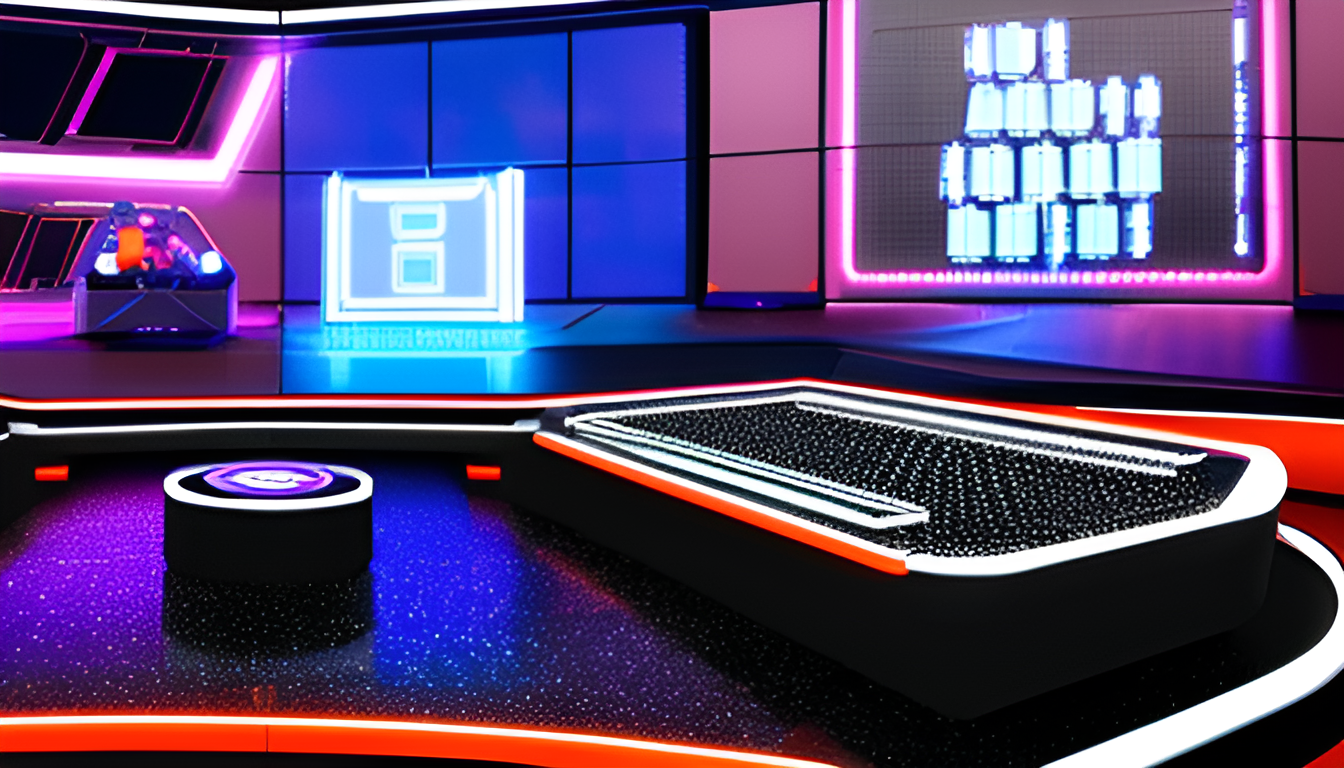
The Future of AI in Hollywood
The film industry is on the brink of a monumental shift, and at the center of this transformation is artificial intelligence. As we look ahead, it’s clear that AI will not just be a tool for script generation but will also redefine how films are conceived, produced, and consumed. Imagine a world where AI can analyze box office trends, audience preferences, and even cultural shifts to suggest plot twists or character arcs that resonate deeply with viewers. This isn’t science fiction; it’s the reality we are stepping into.
One of the most exciting prospects is the potential for AI to assist in storyboarding and visual effects. By utilizing advanced algorithms, filmmakers can create stunning visuals and intricate storyboards at a fraction of the time it currently takes. This means more time for creativity and less time spent on the mundane aspects of production. The collaboration between human creativity and AI efficiency could lead to groundbreaking cinematic experiences that captivate audiences like never before.
However, with these advancements come significant questions about the ethical implications of AI in storytelling. Will AI-generated scripts lack the emotional depth that human writers bring? Or can AI learn to emulate the nuances of human experience? As we embrace these technologies, it becomes crucial for industry stakeholders to address these concerns, ensuring that the human touch remains integral to storytelling.
Furthermore, the integration of AI in Hollywood could lead to a seismic shift in the job market for screenwriters and other creative roles. While some fear that AI might replace human jobs, it’s likely that new opportunities will emerge. Writers might find themselves in roles as AI collaborators, blending human intuition with machine precision to craft narratives that are both innovative and relatable.
In conclusion, the future of AI in Hollywood is not just about automation; it’s about enhancing creativity and expanding the horizons of storytelling. As we navigate this new landscape, the challenge will be to strike a balance between leveraging AI’s capabilities and preserving the essence of what makes storytelling truly magical.
Frequently Asked Questions
- What are AI-generated scripts?
AI-generated scripts are screenplays created using artificial intelligence technologies. These scripts leverage algorithms and machine learning to analyze existing works and generate new narratives that align with audience preferences.
- How is AI changing the screenwriting process?
AI is revolutionizing screenwriting by assisting writers in brainstorming and idea generation. It helps streamline the creative process, allowing writers to focus on enhancing their stories while AI handles data-driven insights.
- Can AI replace human screenwriters?
While AI can generate scripts, it lacks the emotional depth and originality that human writers bring. Instead of replacing screenwriters, AI is more likely to serve as a collaborative tool that enhances creativity.
- What are the challenges of using AI in scriptwriting?
Some challenges include maintaining originality, emotional resonance, and avoiding formulaic storytelling. Writers must ensure that AI-generated content remains engaging and relatable.
- How can screenwriters adapt to AI technologies?
Screenwriters can adapt by embracing AI as a partner in the creative process. Learning to use AI tools can enhance their storytelling capabilities and open up new avenues for collaboration.
- What does the future hold for AI in Hollywood?
The future of AI in Hollywood looks promising, with continuous advancements expected. AI will likely play an integral role in shaping the film industry, influencing everything from script development to audience engagement.
